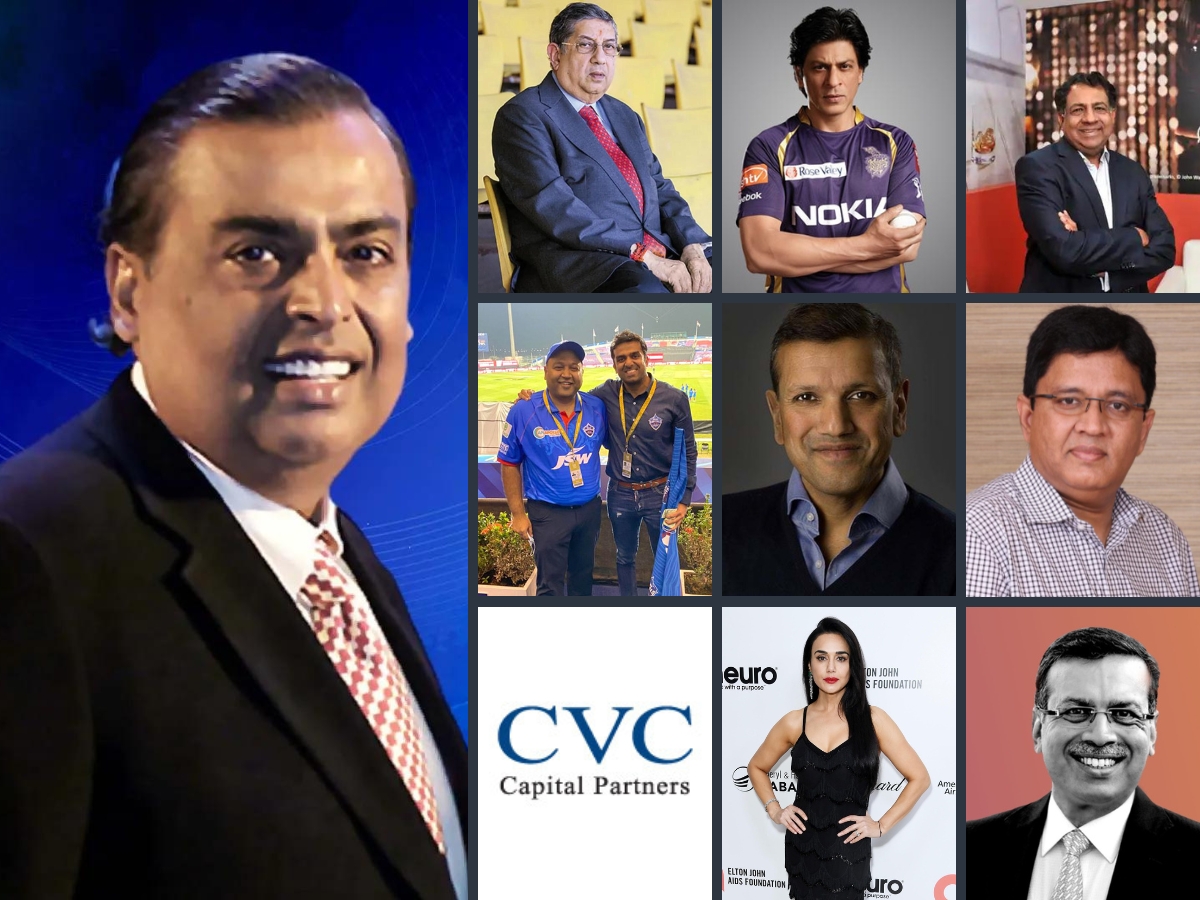The Indian Premier League (IPL) is not just a cricketing spectacle; it’s a convergence of sports, entertainment, and big business. Central to this vibrant ecosystem are the IPL team owners, influential figures who bring together resources, strategy, and a passion for the game. In this article, we spotlight the owners of the 2024 IPL teams, diving into their profiles, net worths, and the unique role they play in shaping one of the world’s most thrilling cricket leagues.
IPL Team Owners: The Complete List of all The 10 teams
1. Mumbai Indians – Mukesh Ambani
- Owners: Mukesh Ambani through Reliance Industries’ subsidiary IndiaWin Sports.
- Net Worth: Mukesh Ambani’s net worth is more than INR 8.08 lakh crore, making Mumbai Indians one of the wealthiest franchises.
- Impact: Under their ownership, Mumbai Indians have won the IPL multiple times, setting a benchmark in team management and player development.
2. Chennai Super Kings – N. Srinivasan
- Owner: N. Srinivasan, Director of India Cements.
- Net Worth: Approximately INR 720 crore.
- Contribution: With a blend of strategic leadership and passion, Srinivasan has seen CSK lift the IPL trophy several times under the captaincy of MS Dhoni, despite facing challenges like a two-year ban.
3. Kolkata Knight Riders – Shahrukh Khan
- Owners: Shahrukh Khan (Red Chillies Entertainment), Juhi Chawla, and Jay Mehta (Mehta Group).
- Net Worth: Shahrukh Khan’s personal net worth is around $63 billion.
- Strategy: Their ownership has brought glamour and aggressive marketing, contributing to KKR’s two IPL titles and a massive fan base.
4. Royal Challengers Bangalore – United Spirits
- Owner: United Spirits Ltd., a subsidiary of Diageo Group.
- Brand Value: INR 6,000 crore.
- Achievements: Despite not winning an IPL trophy, RCB remains one of the most popular teams, with a focus on high-profile players and fan engagement.
5. Delhi Capitals – GMR and JSW Sports
- Owners: GMR Group and JSW Sports.
- Leadership: Kiran Kumar Grandhi (GMR Group) and Parth Jindal (JSW Group) play key roles in the franchise’s decisions.
- Performance: Known for nurturing young talent and transforming into a formidable team in recent years.
6. Rajasthan Royals: Diverse Leadership
- Owners: Manoj Badale (Emerging Media Pvt Ltd), Lachlan Murdoch (Fox Media), Gerry Cardinale (RedBird Capital Partners), Shane Warne.
- Highlights: Winners of the inaugural IPL, the Royals have seen significant changes in ownership, with a focus on innovative cricketing strategies.
7. Sunrisers Hyderabad: Kalanithi Maran
- Owners: Sun TV Network led by Kalanithi Maran.
- Net Worth: Kalanithi Maran’s estimated net worth is $240 Crore.
- Impact: Known for their strategic player choices and winning the IPL under their rebranded name in 2016.
8. Gujarat Titans – CVC Capital
- Owner: CVC Capital Partners.
- Net Worth: $155 billion.
- Strategy: As one of the newest teams, they’ve shown strong performance backed by substantial financial support and strategic planning.
9. Punjab Kings – Preity Zinta
- Owners: Mohit Burman (Dabur), Ness Wadia (Wadia Group), Preity Zinta (PZNZ Media), and Karan Paul (Apeejay Surrendra Group).
- Net Worth and Influence: The owners are well-known figures in their respective fields, bringing diverse experiences to the team.
- Performance: Despite their star power, the Kings have yet to win an IPL title, though they maintain a strong fan following and have shown potential in the league.
10. Lucknow Super Giants: RP Goenka Group Group
- Owner: RP Sanjiv Goenka Group.
- Leadership: Dr. Sanjiv Goenka, a notable figure in Indian business circles.
- Impact: As one of the latest additions to the IPL, they have created a significant buzz and are expected to bring competitive spirit to the league.
The Role of IPL Team Owners
- Financial Muscle: With substantial investments, these owners have turned IPL teams into profitable ventures, enhancing the league’s global appeal.
- Strategic Decision-Making: Involvement in player auctions, team management, and long-term planning are key aspects of their role.
- Fan Engagement and Brand Building: Owners have a great significance in enhancing fan experiences, digital marketing, and community outreach programs.
Challenges and Responsibilities
- Balancing Commerce and Sportsmanship: The challenge lies in maintaining a balance between commercial interests and the integrity of the sport.
- Team Composition and Performance: Decisions regarding team composition and player investments significantly impact the team’s performance.
- Adapting to Changes: Keeping pace with evolving formats, audience preferences, and cricketing trends is crucial.
Future Outlook
- Global Expansion: Owners are exploring expansion into different formats and leagues, enhancing the IPL’s international footprint.
- Technological Integration: Leveraging technology for fan engagement, player performance analysis, and operational efficiency is a growing focus area.
- Sustainable Growth: Ensuring the long-term sustainability of the teams and the league as a whole is a key objective for these owners.
In summary, IPL team owners are not just financial backers; they are integral to the strategic, operational, and cultural fabric of the league. Their diverse backgrounds contribute to the multifaceted nature of the IPL, making it a melting pot of sports, entertainment, and business. As the league evolves, these owners will continue to shape its trajectory, driving innovation and growth in one of the world’s most dynamic sporting events.



